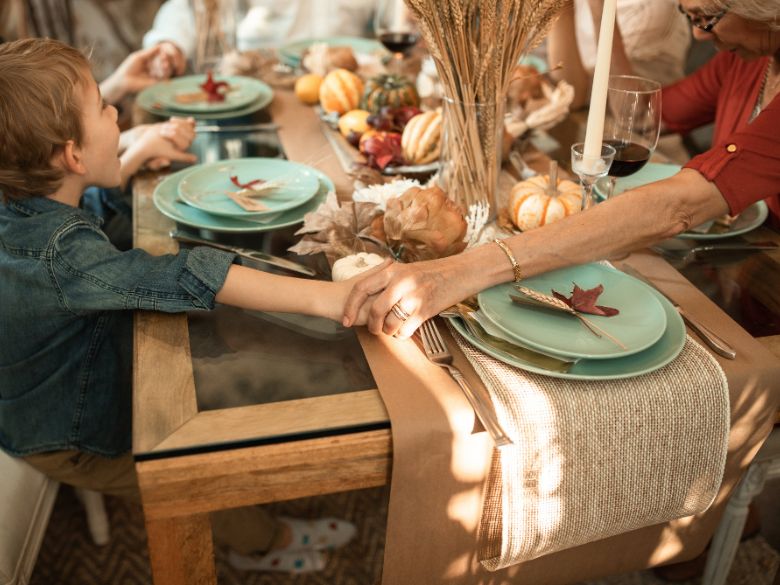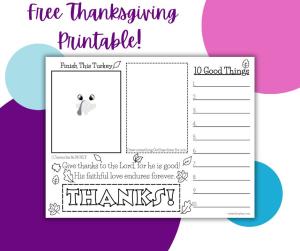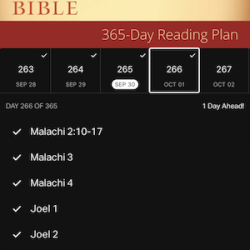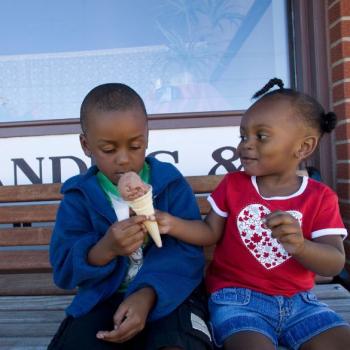
As Christian parents, we know we need to be grateful and we want our kids to be grateful. But, is gratitude developmentally appropriate? Can kids be grateful? Here are 4 tips to help you disciple this Thanksgiving.
Give thanks to the Lord, for he is good!
His faithful love endures forever.
Is Gratitude Developmentally Appropriate for Kids?
Honestly, there isn’t a ton of research on this, but from what I have found, the ability to be grateful and express it is a slowly developed ability. Some kids will begin to be able to say thank you as a learned response, but they don’t completely understand gratitude. This begins around 2-3.
Around 4-5, kids will be able to say thank you with a bit more understanding. At this point, it is more relational though rather than based on whatever was done for the child.
Around 7, kids feel morally grateful, based on reciprocity. Around 11-12 is when what we would understand to be gratitude can be felt and expressed more deeply.
Obviously, all kids develop at their own rate and these are just estimates based on limited studies.
Model Gratitude for Thanksgiving Discipleship
I’ve said it before, and I will say it again, but any discipleship begins with us. If we want grateful kids, we must model being grateful parents.
If we model what it means to be grateful, our kids will more easily pick it up for themselves. You’ve heard the expression, “More is caught than taught.” It is true with gratitude as well.
We can say thank you to our kids, even for the things they are expected to do. We can praise God aloud for big and little things. Did you misplace your keys? Say thank you to God when you find them. Did you have just enough milk for a recipe? Praise God so your kids hear it. Did your kid do well on an assignment? Point your kids to God with your worship of him, not just them.
Saying a blessing before meals is an easy and convenient time to practice gratitude. Jesus even thanked God for many meals in the Bible.
While Thanksgiving is a natural time to disciple your kids about gratitude, don’t keep it only to the month of November.
Base Gratitude on Relationships
As kids begin learning about gratitude in the preschool years and even early elementary school, consider it to be a very relational thing. They will be more grateful for you for a glass of milk than for a farmer who provided the milk.
As you discuss things to be grateful for, find ways to tie them back to your kids. Kids are trying to figure out their place in the world and how things relate to them. If we can help them to make personal connections to the world, gratitude will come easier.
Talk about the family members you may not see often, but will be sharing Thanksgiving with. Remind your kids that it can be easier to feel thankful when we are together, but our gratitude for a person can last even when we aren’t together.
Consider Your Concrete Thinkers
The idea of gratitude is a pretty abstract concept. Think of concrete ways to express and explain gratitude to your kids.
Talk about “good things.” Who are the people they enjoy spending time with? How do they feel when you make their favorite meal? What things in the Bible make them say “Wow, God!”?
Share why you are grateful for different foods as you set the table or put them on your plate while you are at the Thanksgiving table.
Practice Gratitude Together in A Variety of Fun Ways
Forcing kids to say thank you can steal the joy of gratitude from a child. It becomes a chore. As a parent, even when I know things are good for my kids, it can cause more harm than good to force them.
Like with Bible reading, prayer, and worship, gratitude is best when it is done cheerfully and from the heart. Gratitude is best when it is not a chore, but a choice.
Making gratitude playful and a relational, connecting activity helps to make it more attractive and something your children willingly express.
Here are a few ways to play with gratitude:
- Sing it in a silly song
- Tell your kids that you are grateful for their quirks or each part of their body (with fun adjectives like stinky feet) while tapping or tickling them
- Make cookies to show your gratitude
- Do an art project to share with someone
- Video chat with grandma just to tell her you are grateful for her
- Buy a friend a balloon and take it to their house just to say you love them
- Say a playful thank you prayer to God for your favorite things
- Create a blessing boogie and dance out your gratitude
- Sing a fun blessing before meals.
Want a free Thanksgiving activity printable that you can use on its own or as a placemat? Grab it here!


















